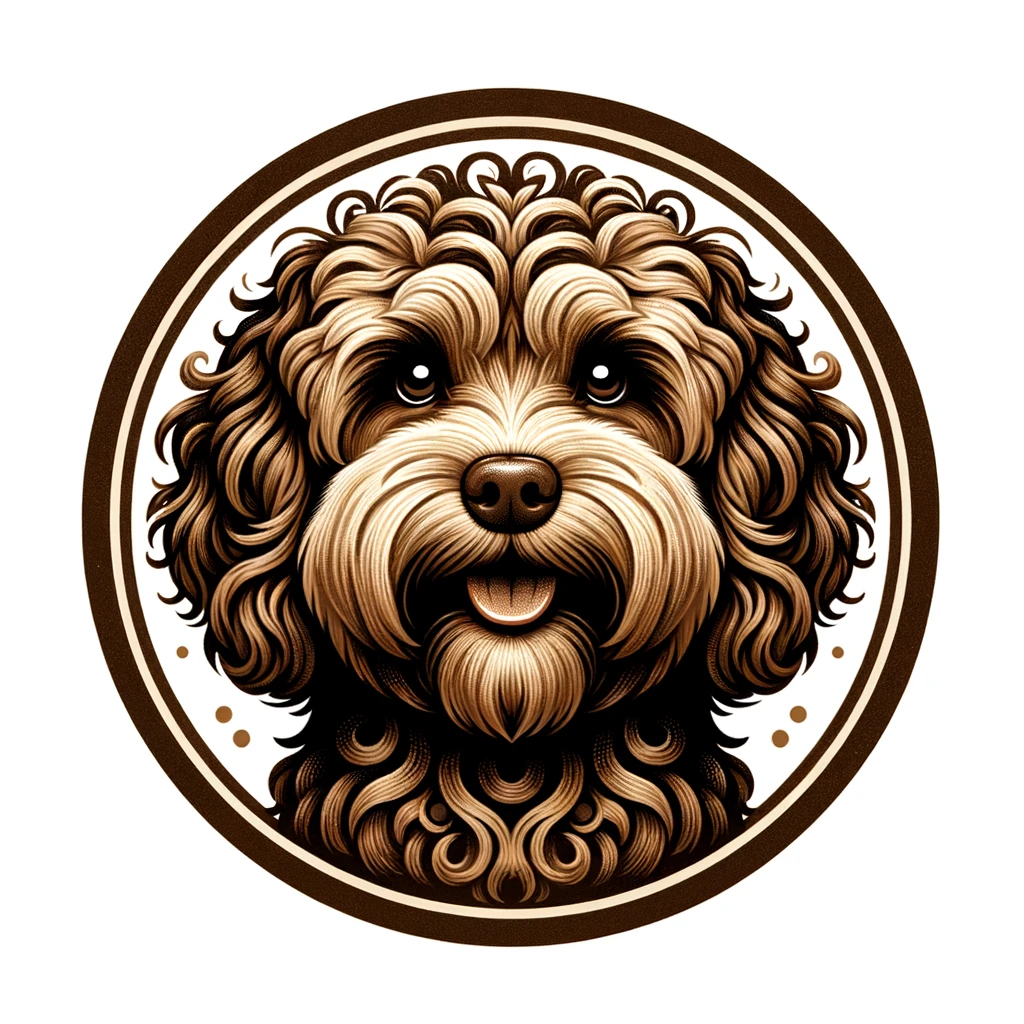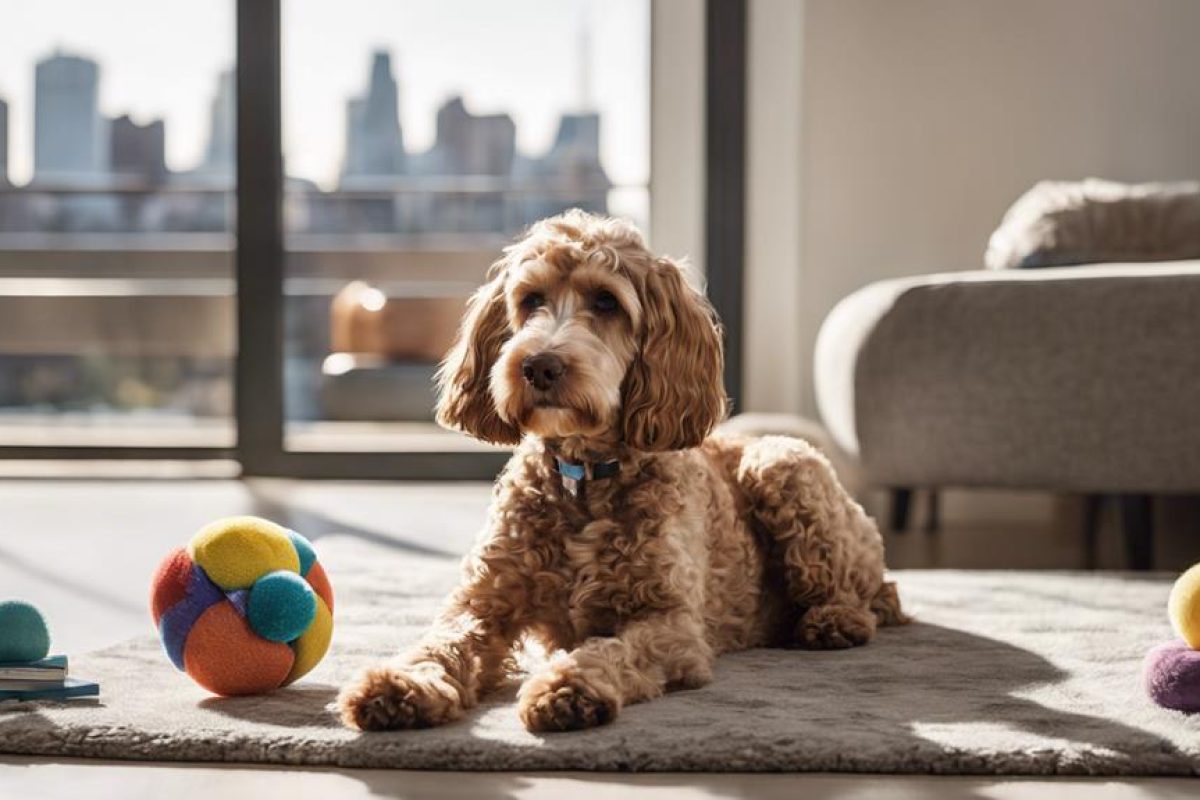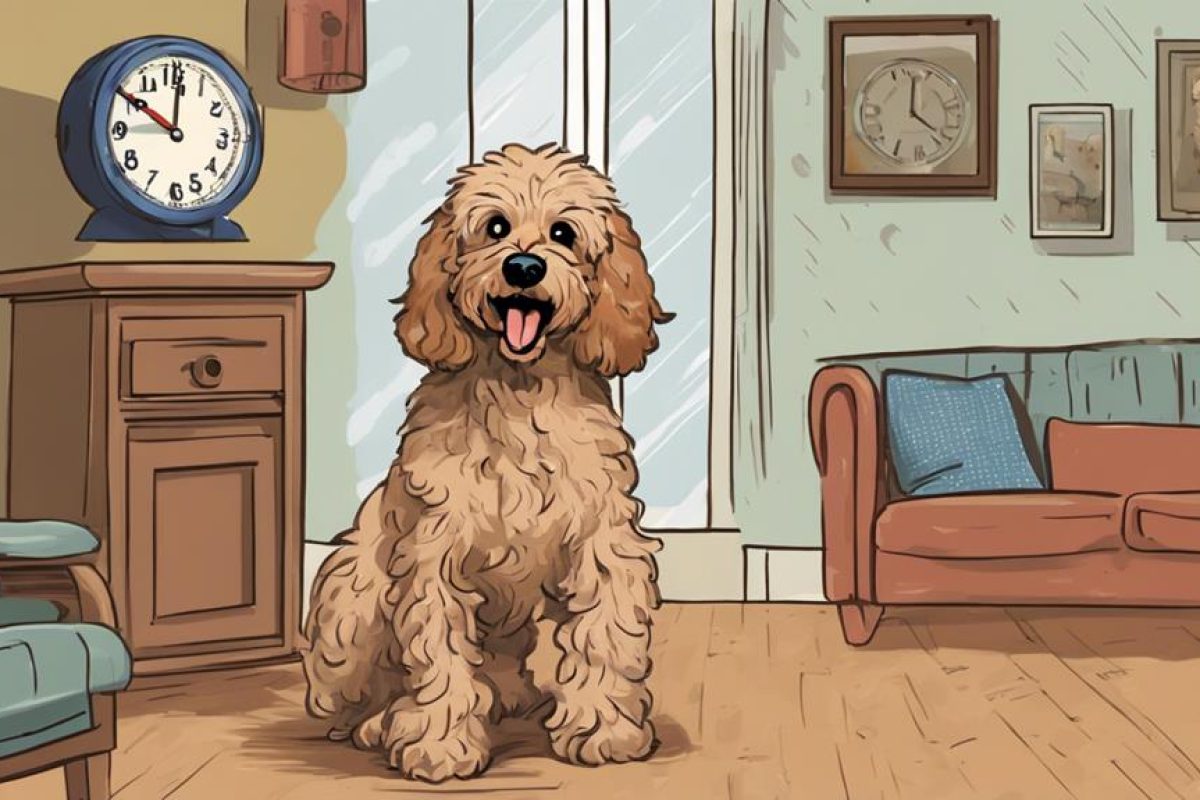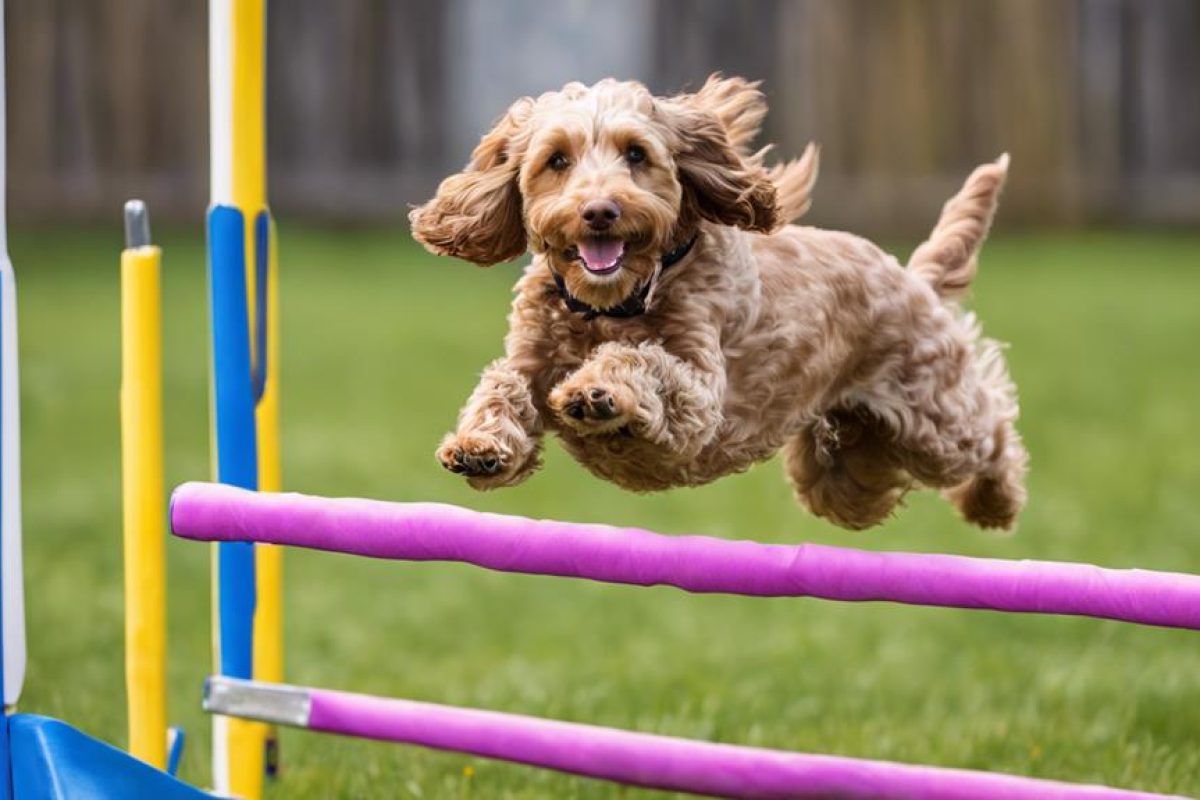As your beloved cockapoo enters their golden years, it’s important to understand the changes they’ll go through and how to make their life as comfortable and happy as possible. You’ll need to keep a close eye on their activity levels, sleeping habits, eating patterns, and overall health. Be on the lookout for any significant shifts, like increased thirst or a decrease in appetite. Providing soft, cozy bedding and creating a relaxing environment suited to their needs becomes extra crucial at this stage.
Regular check-ups with your vet are an absolute must for catching any potential health issues early on, like arthritis. And don’t forget about maintaining their dental hygiene, controlling their weight through diet and exercise, and implementing gentle fitness routines tailored to aging pups. Changes in behavior or overall wellness can be some of the first signs that your cockapoo is getting older, so stay vigilant! With some adjustments and extra TLC, you can ensure these final years are their best yet.
Key Takeaways
- Regular vet check-ups are crucial for early detection of health issues in older cockapoos.
- Transition your cockapoo to a senior dog food, ensure hydration, and control portions to maintain a healthy weight.
- Implement gentle exercise routines and arthritis management strategies for joint health.
- Prioritize dental care with regular tooth brushing, balanced diet, and vet checks.
- Ensure comfort in their golden years by providing an orthopedic bed, maintaining appropriate temperature, and creating a quiet environment.
Understanding the Aging Process
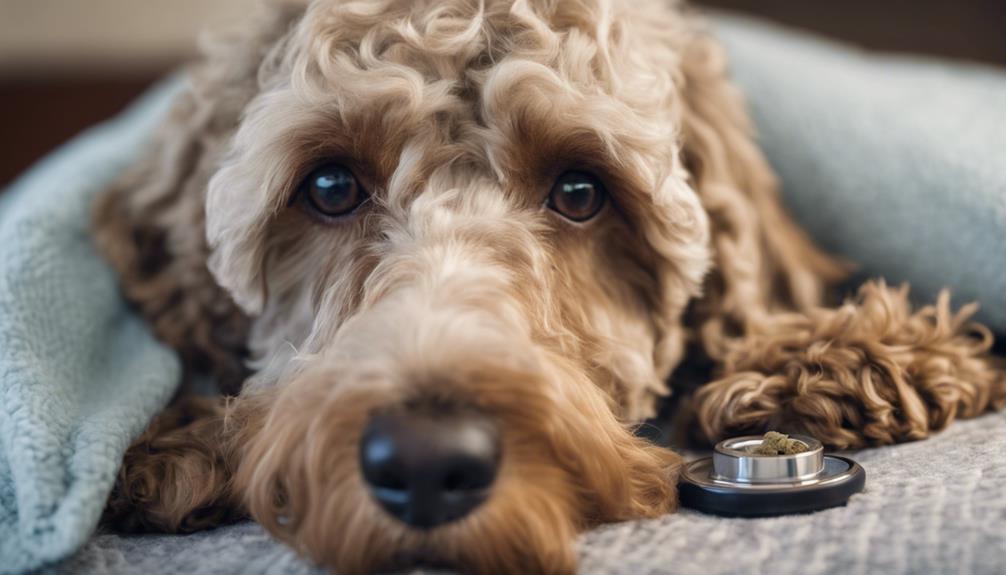
Older dogs, just like older humans, go through lots of physical and mental changes as they age. For cockapoos specifically, you can generally expect to see those first signs of senior citizenship kick in around 7 or 8 years old. Maybe they’ve got a little gray fur coming in, or they’re getting a bit slower on walks and sleeping more than they used to.
It’s common for aging dogs to develop issues with their vision and hearing too. So if your old pal seems confused or is struggling to respond to you like normal, diminishing senses could be the cause. You might also notice shifts in their eating and drinking habits or irregular bathroom routines.
The key thing to remember is that every cockapoo ages differently. Some sail through their senior years, while others struggle more. Staying on top of regular vet visits is crucial for monitoring your pup’s health and catching any red flags early.
Aging isn’t an illness – it’s just part of the journey. By making some small adjustments and offering lots of love and patience, you can absolutely help your cockapoo live out their golden years in comfort and happiness.
Dietary Adjustments for Senior Cockapoos
What your aging cockapoo puts in their belly becomes extra important as the years go by. You’ll likely need to make some adjustments to their diet to accommodate their evolving nutritional needs and metabolism. Here are some tips:
Be on high alert for food allergies that could develop. If your cockapoo starts having tummy issues or seems itchier than usual, they may have become allergic or sensitive to an ingredient in their regular food. Your vet can help you identify potential allergens to avoid.
Keeping them well-hydrated is crucial. Older dogs sometimes forget to drink as much water, which can lead to dehydration and other problems. Make sure to refill that water bowl frequently and encourage them to drink.
At a certain age, it’s wise to transition your cockapoo to a specialized senior dog food formula. These recipes have higher fiber and vitamin/mineral levels designed to support aging bodies and brains, while reducing calories to prevent weight gain.
Speaking of weight – your aging pup might need to start eating smaller portions to maintain a healthy figure. Obesity can seriously exacerbate joint issues and other age-related conditions. Stick to a strict feeding schedule and measure out appropriate portions for your cockapoo’s size.
Exercise Regimen for Older Dogs
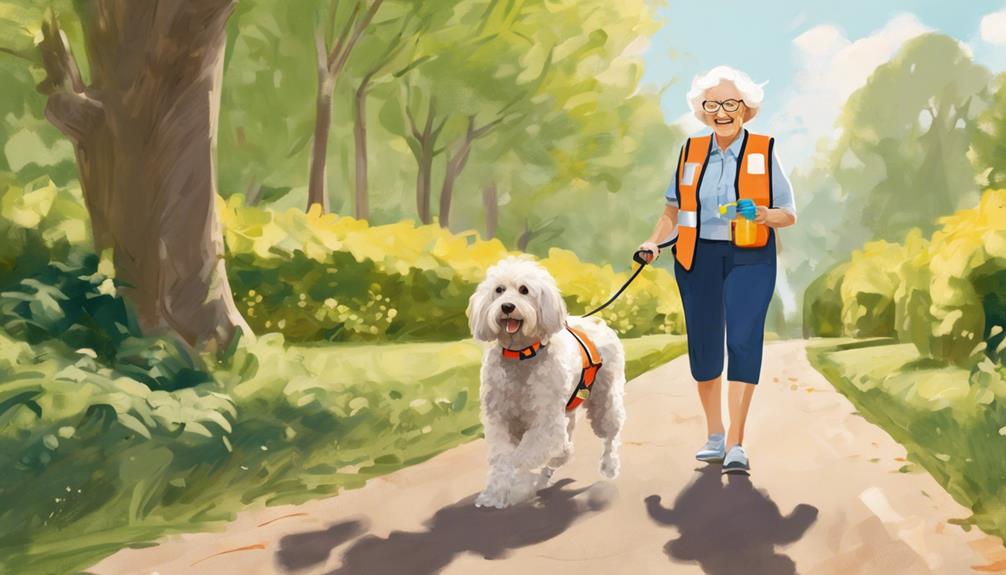
You might think since your cockapoo is slowing down, they don’t need as much exercise. But actually, keeping them active through low-impact activities is crucial for maintaining their physical and mental health! The key is modifying their routine to accommodate aging joints and muscles.
Something like canine hydrotherapy – exercising in a warm therapy pool – is the perfect way to get your senior cockapoo moving without stressing their body too much. The water supports their weight and enhances mobility. Most doggy exercise facilities offer hydrotherapy sessions specifically for arthritic or senior pups.
At home, you can engage your oldie but goodie with some fun training games designed to keep their mind sharp. Teaching them new tricks like “wave,” “spin,” or “roll over” is great mental stimulation. Just keep the sessions short and adjust for their stamina.
And of course, daily walks around the neighborhood are still a must, even if you have to take it slow. The fresh air, new smells, and chance to sniff around does wonders for their spirit!
Importance of Regular Vet Check-ups
We all know dogs age way faster than humans, so staying on top of your cockapoo’s health as they get up there in years is absolutely vital. Think about how much can change for them in the span of just 6-12 months!
Regular vet visits – at least twice a year for senior dogs – allows your veterinarian to closely monitor your pup’s condition and catch any changes or potential issues early. Things like arthritis, insulin resistance, kidney/liver problems, and cancer are just some of the concerns that become more common with age.
Your vet can also ensure your cockapoo gets updated on any necessary vaccinations to keep their immune system strong as it starts to weaken. And if caught soon enough, many age-related conditions can be managed through medications, diet, or therapies.
Preventative care like dental cleanings becomes extra important too. Plenty of cockapoos develop periodontal disease in their senior years, which can lead to bigger problems if left unchecked.
The bottom line is, you don’t want to take any chances with your elderly pup’s wellbeing. Biannual check-ups with a trusted vet are absolutely essential.
Detecting and Managing Arthritis
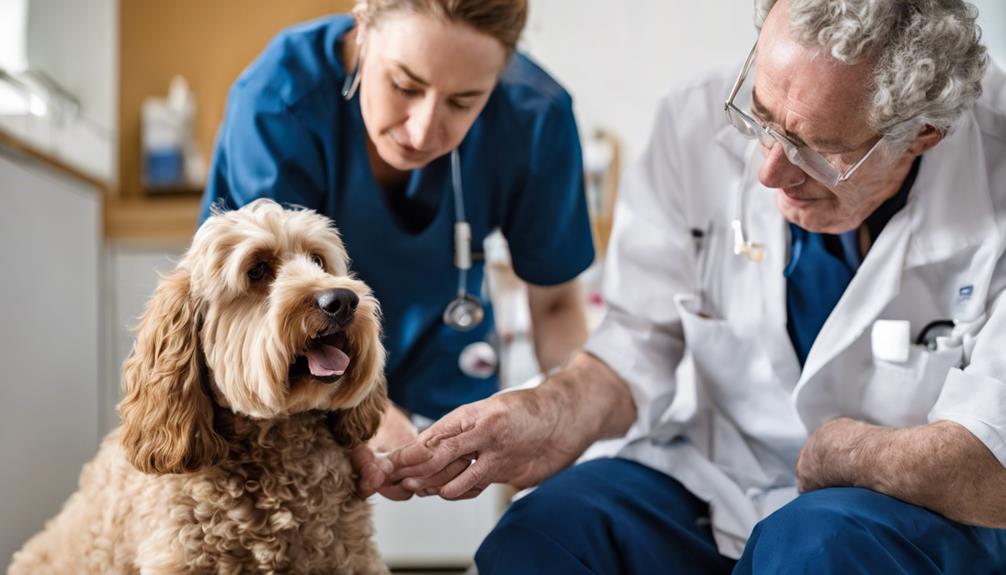
One of the most common conditions cockapoos face as they get up in years? You guessed it – arthritis. Years of energetic running, jumping, and playing can really start to take a toll on their poor joints. And unfortunately, some level of arthritis is almost inevitable for older dogs.
The key signs indicating your pup could be developing the condition include stiffness (especially after napping or first thing in the morning), limping, reluctance to go up/down stairs, and seeming discomfort when you pick them up. If you spot any of these red flags, it’s time to get them evaluated.
Managing arthritis usually involves a multi-pronged approach. Your vet may prescribe medications like anti-inflammatories or pain relievers to help ease discomfort and swelling. But you’ll also want to look into supplementary therapies that can enhance mobility:
- Warm water hydrotherapy sessions
- Gentle massage therapy
- Acupuncture treatments
- Incorporating joint supplements like glucosamine and chondroitin
It’s also absolutely crucial to help your arthritic cockapoo maintain a healthy weight through diet and moderate exercise. Extra pounds only amp up the pressure on their already stressed joints.
With some patience, love, and medical care, you can absolutely help keep your sweet pup comfortable and spry in their old age, even with arthritis!
Dental Care for Senior Cockapoos
We’ve all been there – dog breath is no joke. And it often seems to get even more pungent as our pups get up there in years. But sadly, stinky dog breath isn’t the only dental issue elderly cockapoos face. They become way more prone to developing gnarly dental problems that can seriously impact their overall health if left unchecked.
That’s why focusing on their chompers through these final life stages is so important. Brushing those teething, at minimum, a few times a week using doggy-safe toothpaste can go a long way in preventing plaque and tartar buildup. Getting them in the habit of tolerating teeth brushing from an early age makes this process easier.
You’ll also want to make sure they’re eating a dental-friendly diet full of crunchy kibble designed to help scrape away buildup. And suppliers like edible dental chews can work wonders for elderly cockapoos who refuse to let you brush.
Arguably most important of all are those professional deep cleanings performed by your vet at least once a year. They’ve got all the specialized tools to really get in there and remove hardened tartar your brush just can’t tackle. Staying on top of your cockapoo’s oral care will prevent gum disease, tooth decay, and the potential of those issues spreading bacterial infections throughout their body.
Mental Stimulation for Your Cockapoo
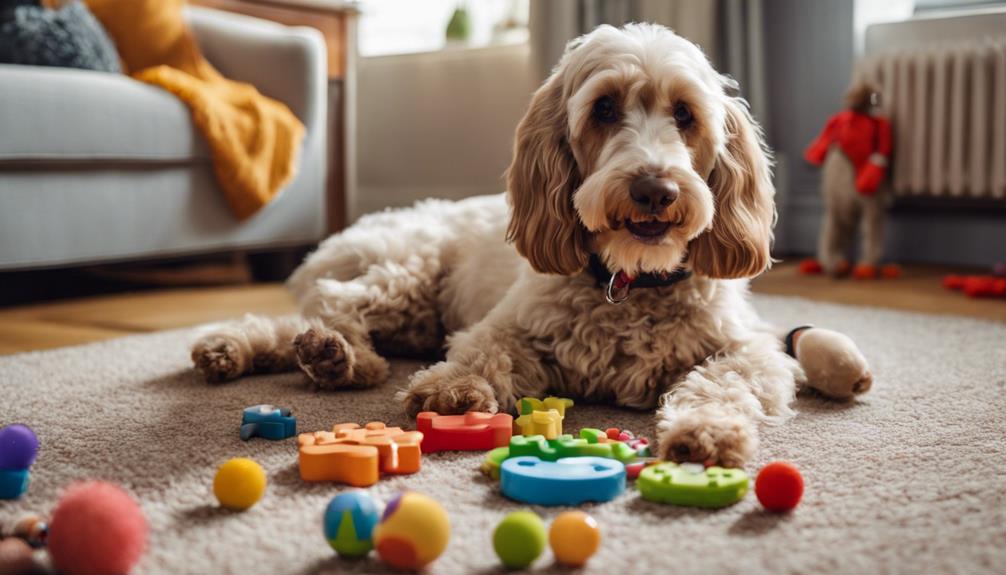
Keeping your senior cockapoo’s body in tiptop shape is crucial – but so is exercising their brain as those puppy years fade into distant memories! Mental stimulation does wonders for preventing cognitive decline and boredom, two big issues elderly dogs frequently face.
One of the easiest ways to keep their minds engaged? Interactive toys and puzzle feeders! These awesome contraptions encourage your cockapoo to sniff out treats while using their problem-solving skills (the most popular versions make them paw at levers or stroke the right spot to release a tasty morsel). They’ll happily work away on these for hours, feeling accomplished each time they score a reward.
You can also rotate in other classic brain games like hide-and-seek around the house, fetching specific toys by name, or running them through trick routines that challenge their memory. The key is to mix things up regularly so their minds stay active!
Getting creative with indoor and outdoor activities that tap into their natural instincts – like setting up pup-friendly obstacle courses or going on extra sniffy walks – helps too. Anything that engages their senses of smell, sight and sound in new ways is excellent mental exercise.
Maintaining Healthy Weight
Speaking of physical exercise, making sure your senior cockapoo maintains a healthy weight as their metabolism slows down is absolutely vital for their longevity and mobility. Letting an older pup become obese puts them at much greater risk for all sorts of issues like diabetes, heart disease, and joint problems.
It might be tempting to keep dishing out the standard portions your energetic youth once scarfed down. But in reality, your senior cockapoo probably needs way fewer calories than they used to in order to stay trim and svelte. Study up on proper daily portion sizes for their age and size, and stick to measuring out their meals. Using a smaller bowl or segmented dish can help prevent overfeeding too.
At the same time, you want to ensure your oldie but goodie is getting plenty of nutrient-dense foods packed with quality proteins and vitamins to fuel their body and brain. Trade out those calorie-bomb store-bought treats for healthier options like fresh veggies or freeze-dried meats.
Of course, the other half of the equation is keeping them physically active with gentle, low-impact exercise tailored to aging joints and muscles. Daily walks around the block, supervised swimming sessions, or indoor games of fetch all get those wheels turning without over-exerting them.
With tweaks to both their diet and their fitness routine, you can absolutely keep your senior cockapoo at a stable, healthy weight during these final years!
Grooming Needs of an Older Cockapoo
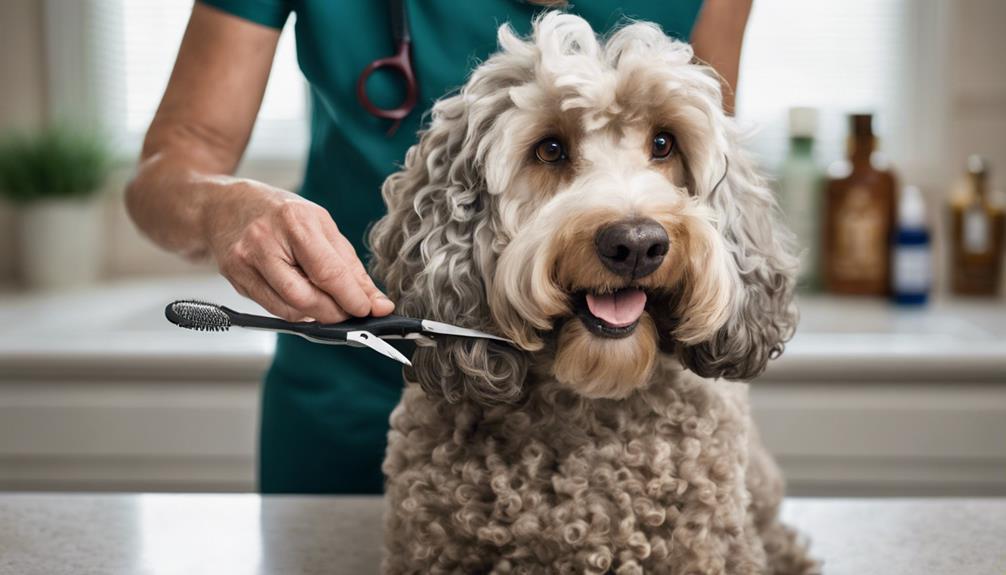
We totally understand – the last thing on your mind when caring for an elderly pet is probably their grooming and beauty needs. But trust us, keeping up with regular baths, brushings, nail trims, and other pampering sessions becomes extra important for a few key reasons.
For starters, elderly cockapoos frequently start developing more issues with excessive shedding and matting as they age. Gently brushing them every few days with a high-quality slicker or deshedding tool helps capture loose hair before it becomes a mess. It’s also excellent for distributing skin oils and increasing circulation.
Then there’s the very common issue of tear staining that plagues many senior pups. Those unsightly reddish-brown streaks trailing from their eyes isn’t just aesthetically unappealing – it can actually cause painful irritation if left unchecked. Using a dog-safe cleanser and keeping that area meticulously trimmed is key.
And finally, maintaining a regular grooming routine keeps your cockapoo acclimated to being handled and having their paws, ears, and other areas accessed. Since elderly dogs frequently experience things like vision and cognitive decline, you want grooming sessions to remain a familiar, comforting experience rather than a stressful ordeal.
So set a grooming schedule that works for both you and your pup, and focus on making it as pleasant as possible with plenty of treats rewards and breaks. Not only does it tend to their physical needs, but it provides wonderful opportunities for bonding too!
Providing Comfort in Their Golden Years
Above all else, the number one priority when caring for an elderly cockapoo is making sure they feel comfortable, secure, and content for the duration of their golden years. Setting up the perfect environment tailored to their aging needs is so important.
First off, you’ll want to make adjustments to their favorite sleeping spots to provide optimal orthopedic support. Invest in a plush, high-quality dog bed with cushiony bolsters to relieve pressure on aging joints and bones as they snooze. You may even want to consider a heated bed if your pup is really struggling with mobility.
Temperature regulation becomes a major issue for many senior dogs too. Keep their favorite hangout spots free from cold drafts from windows or vents, and make sure it’s never too hot or cold in those areas. Provide plenty of warm blankets to snuggle into, or lay down some cooling pads in the summer months.
If your cockapoo is struggling with vision loss or balance, you may need to adjust their living quarters to add support structures and clear obstacles. Setting up pet ramps or secure steps to assist them on and off furniture prevents painful tumbles. You’ll also want to block off any safety hazards like staircases to avoid falls.
And finally, keeping their minds engaged and stimulated through puzzle toys, background noise from TVs/radios, and mental exercises will do wonders to prevent boredom, loneliness, and cognitive decline. Regular bonding sessions through grooming and gentle play will keep their spirits high too.
With some tweaks and accommodations, your home can absolutely become a total sanctuary where your aging cockapoo feels perfectly safe, comfy, and content as they ride out their final years.
Frequently Asked Questions
What Are Some Common Behavioral Changes That I Can Expect as My Cockapoo Ages?
It’s totally normal for senior dogs to start exhibiting a “crankier” demeanor or seem generally less interested in playing or learning new things. Their responsiveness to commands you’ve worked hard to ingrain may start faltering too as cognitive decline sets in. Managing their environment carefully and revisiting gentle training can help minimize frustrations.
How Does Caring for an Older Cockapoo Differ From Caring for a Puppy or Younger Adult?
The needs between life stages differ hugely! Senior dogs require specialized diets, exercise regimens designed for aging bodies, more frequent vet visits, medications for chronic conditions, and cozy accommodations that prioritize their comfort over everything else. It’s a major shift from the go-go-go of puppyhood.
Are There Any Specific Breeds or Sizes of Cockapoos That Age More Quickly or Have More Health Issues in Their Senior Years?
Not necessarily – assuming they’re getting proper nutrition, exercise, and veterinary care, most cockapoos should enjoy relatively similar lifespans and senior experience regardless of their specific mix or size. Larger poodle mixes may be a bit more prone to joint issues later on, but that’s not a hard rule.
Are There Any Specific Medications or Supplements Recommended for Older Cockapoos?
There’s no one-size-fits-all here, as every senior pup will likely have different needs based on their specific conditions and vet recommendations. Joint supplements like glucosamine and chondroitin are super common, as are anti-inflammatory meds, pain relievers, and supplements for cognitive health. Always loop in your vet before starting anything!
